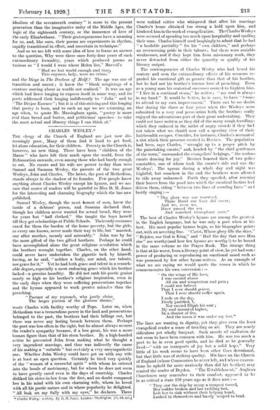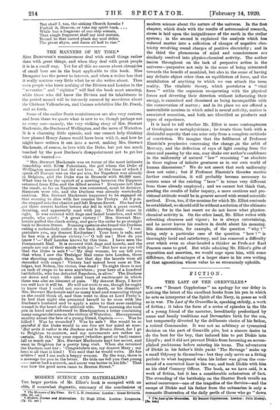CHARLES WESLEY.* TILE clergy of the Church of England are
just now dis- tressingly poor.. Many of them find it hard to get food, let alone education, for their children. Poverty in the Church is, however, no new thing. There have been " children of the Manse " who have left their mark upon the world, from the Reformation onwards, even among those who had barely enough to eat. No curate and his wife are poorer to-day than were Samuel and Susanna Wesley, the parents of the two great Wesleys, John and Charles. The latter, the poet of Methodism, stands always in the shadow of its founder. Few people know anything about Charles Wesley except his hymns, and we are sure that scores of readers will be grateful to Miss D M. Jones for the interesting and charming biography which she has now published.
Samuel Wesley, though the most honest of men, knew the inside of a debtors' prison, and Susanna declared . that, though her children never wanted for actual bread, they were for 3-ears but " half clothed." She taught the boys herself till they got scholarships at Public Schools. Their early successes cased for them the burden of the home poverty, but the girls, as every one knows, never made their way in life, but " married, one after another, meanly and miserably." John was by far the more gifted of the two gifted brothers. Perhaps he could have accomplished alone the great religious revolution which the brothers wrought together. Charles, on the other hand, could never have undertaken the gigantic task by himself, having, as he said, " neither a body, nor mind, nor talents, nor grace for it." Yet he had both grace and talent in a remark. able degree, especially a most endearing grace which his brother lacked—a genuine humility. He did not rank his poetic genius nearly so high as his brother's religious inspiration, even in the early days when they were suffering persecutions together and the hymns appeared to work greater miracles than the preaching.
" Partner of my reproach, who justly claim The larger portion of the glorious shame," wrote Charles with facility worthy of Pope. Later on, when Methodism was a tremendous power in the land and persecutions belonged to the past, the brothers had their fallings out, but there was never any lasting breach between them. Perhaps the poet was less often in the light, but he almost always secures the reader's sympathy because, if a less great, his was a more human figure than that of his stem brother. By a high-banded action he prevented John from making what he thought a very imprudent marriage, and thus was indirectly the cause of his making a " suitable " but certainly a very unsympathetic one. Whether John Wesley could have got on with any wife is at least an open question. Certainly he tired very quickly of the " woman of a sorrowful spirit " with whom he entered into the bonds of matrimony, but for whom he does not seem to have greatly eared even in the days of courtship. Charles disliked his sister-in-law from the first, and no doubt compared her in his mind with his own charming wife, whom he loved with all his poetic nature and in whose popularity ho delighted. " All look on my Sally with my eyes," he declares. There
• Charles lratem: a Study. By D. Jt. Jones. London: Skettington; trs. 6dolet.1
were unkind critics who whispered that after his marriage Charles's home obtained too strong a hold upon him, and hindered him in the work of evangelization. The Charles Wesleys were accused of spending too much upon hospitality and spoiling their sons. Charles himself used laughingly to admit that he had " a laudable partiality " for his " own children," and perhaps an overweening pride in their talents ; but thcse were amiable weaknesses, and if they kept him from missionary work, they never detracted from either the quantity or quality of his literary output.
The contemporaries of Charles Wesley who had heard his oratory and seen the extraordinary effects of his sermons re- garded his emotional gift as greater than that of his brother, but ho had not his brother's intense love of preaching. Even
as a young man his oratorical successes seemed to frighten him. " I live in a continual storm," he writes ; " my soul is alway.4 in my hand." It would be better, he is sure, to have " Isisuro
to attend to my own improvement." There can be no doubt that during the three or four years when the Wesleys were submitted to a very real persecution both the brothers really enjoyed the adventurous part of their great undertaking. They could not have written as they did of the many rough-handling; which they endured in the midst of angry crowds if they had not taken what we should now call a sporting view of their hairbreadth escapes. Consider, for instance, Charles's account of a riot which their presence created in Devizes. The population had been, says Charles, " wrought up to a proper pitch by the painstaking curate," and, headed by " the chief gentleman of the town," surrounded the evangelists' lodgings, " the zealous curate dancing for joy." Devizes boasted then of two police constables, one of whom took the curate's side and one the Wesleys'. The uproar during a whole day and night was frightful, but somehow in the end the brothers were allowed to ride away unharmed. Forth they speeded, after rescuing their horses from the pond into which the curatical faction grad driven them, riding " between two lines of scowling faces " lustily singing :— .
" Thy glory was our rearward, Thine Hand our lives did cover; And we, even we, Have passed the sea
And marched triumphant over."
The best of Charles Wesley's hymns are among the greatest in the English language, but he was only a poet when at his best. His most popular hymns begin, as his biographer points out, with an arresting line. "Christ, Whose glory fills the skies," " Rejoice, our God is King," and " Hail the day that sees Hint rise" are worthy (and how few hymns are worthy !) to be bound in the same volume as the Prayer Book. The strange thing
is that at his worst, from a literary point of view, he yet had some power of producing or reproducing an emotional mood such as was possessed by few other hymn-writers. As an example of what we are saying we would quote the verses in which he commemorates his own conversion :-
" On the wings of His love, I was carried above All sin and temptation and pain ; I could not believe That I ever should grieve, That I ever should suffer again.
I rode on the sky, Freely justified, I, Nor envied Elijah his seat ; My soul mounted higher, In a chariot of fire,
And the moon it was under my feet."
The lines are wanting in dignity, yet they give even the least evangelical reader a sense of treading on air. They are nearly ridiculous yet wholly buoyant. Such moods of exaltation do not seem to have been common with him. Ho was too much a poet to be in even good spirits, and he died as he generally lived—" with no transports of joy but a solid hope." Very little of his work seems to have been other than devotional, but that little was of striking quality. His lines on the Church of England (whose Communion he never left, and whose conven- tions he upheld far more anxiously than did his brother) may remind the reader of Dryden. " The Establishment," Anglican Churchmen may remember to their comfort, appeared to be in as critical a state 170 years ago as it does now :-
" They saw the ship by many a tempest tossed, Her rudder broken and her tackling lost, Left her to sink without their helping hand, Looked to themselves and basely 'seeped to land.
But shall I, too, the sinking Church forsake ? Forbid it, Heaven, or take my spirit back. . . . While but a fragment of our ship remain, That single fragment shall my soul sustain. Bound to that sacred plank my soul defies The great abyss, and dares all hell to rise."



































 Previous page
Previous page